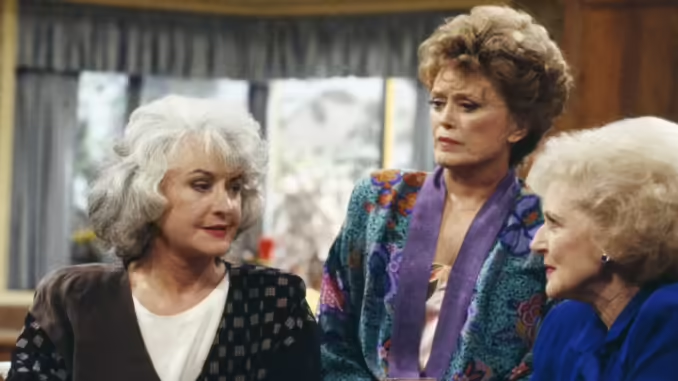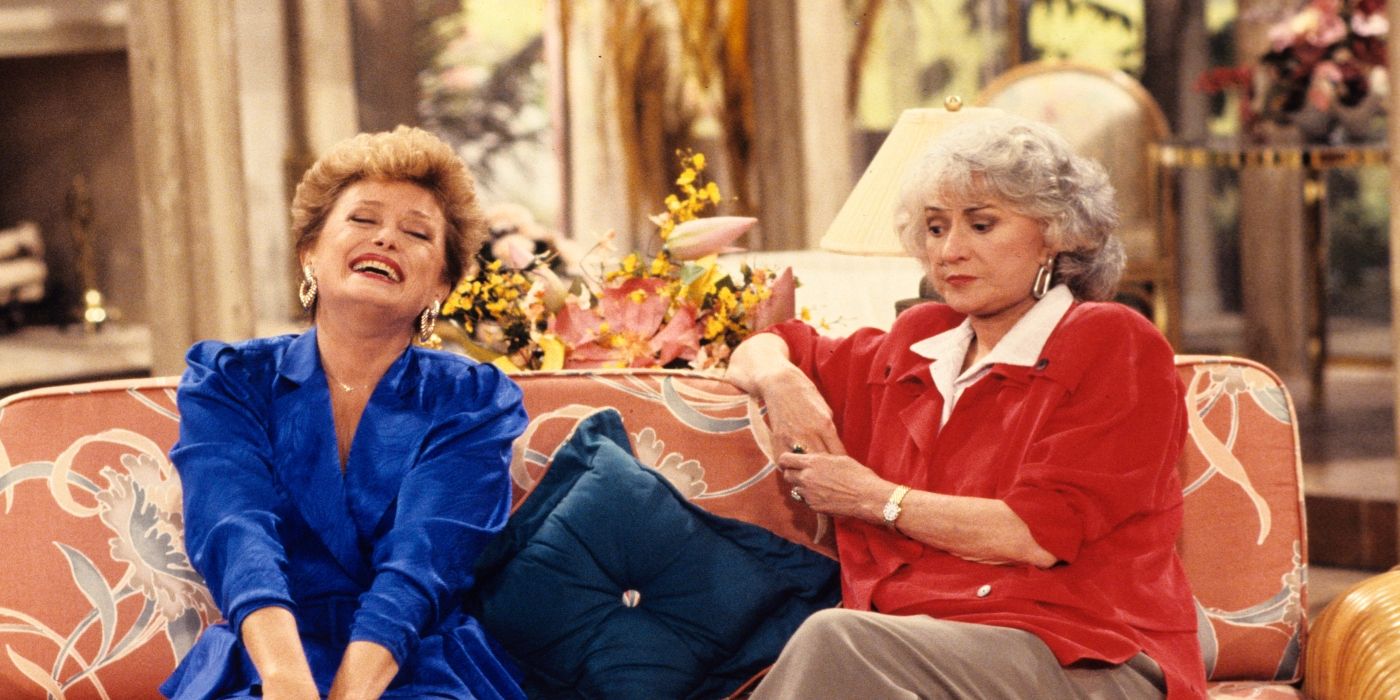
How Betty White’s Rose Nylund Gave ‘Golden Girls’ the Perfect Character to Take on Queer Social Issues
In between telling outrageous St. Olaf stories, Rose had her own share of wisdom.
In 1985, The Golden Girls aired its first season and quickly became a primetime darling. Everyone adored the show but one of its biggest fanbases belonged to the LGBTQ community. It’s easy to see why: the half-hour sitcom involved a rather unorthodox family. The sarcastic Dorothy (Bea Arthur) and her mother, the spitfire Sophia (Estelle Getty), were the only blood relatives. Along with the spacey Rose (Betty White), all three lived under the Miami roof of the lustful Blanche (Rue McClanahan). Together, they endured passing romances and problem-solved over cheesecake.
The Golden Girls secured its LGBTQ fanbase thanks to the television tradition of a “very special episode.” This sitcom method introduced a taboo subject matter by bringing in a previously undiscussed character and then just as quickly, never addressing them again. What made The Golden Girls unique was it concerned itself with both LGBTQ representation and social issues repeatedly. At the center of three of these “special episodes,” was Betty White. Along with the innocence she imbued into her character of Rose, there was an inherent sweetness and this was what the show used to disarm its audience.
In Season 2, “Isn’t it Romantic,” Dorothy’s friend, Jean (Lois Nettleton) visits the Miami household. Despite Dorothy’s worries to Sophia about how to address Jean being a lesbian to Rose and Blanche, she fits right in. It helps that both Blanche and Rose mistakenly believe that Jean’s deceased partner, Pat, was a man. The episode’s main conflict pops up when Jean and Rose grow close and Jean admits to Dorothy she’s developing a crush. When Blanche finally gets pulled into the situation, she gets so flustered at the revelation that Jean would prefer Rose over her and no one figures out the best solution. It’s only when Rose finds out that she takes it upon herself to approach Jean. Despite not sharing the same feelings, she hopes they can be friends and Jean is more than welcome to the idea. The offscreen death of Jean’s partner is given nuance and with it, common ground with Rose, Blanche, and Sophia. The episode is best summed up with a quote from Decider: “With Jean, we see a woman in mourning for her partner–an emotional state that the girls relate to, having lost their husbands. The point, subtly made, is that Jean’s same-sex love and loss is the same as everyone else’s love and loss.” The LGBTQ representation was only getting started.
In Season 4, “Scared Straight,” Blanche’s brother, Clayton (Monte Markham), arrives for a visit. Believing him to be as much of a woman-lover as she’s a man-lover, Blanche is more than oblivious that he’s in the closet. But when Clayton runs into Rose at a park, he confides in her what he has held off from telling his sister. The fact that it’s Rose who learns this first, is telling. The main job she’s held during the first half of the series was at a grief counseling center. She had to listen patiently and respond kindly to clients and she does the same with Clayton. The two agree he’ll come out to his sister but back at the house, he botches the attempt by telling Blanche he’s having an affair with Rose instead. Blanche instantly gives Rose the cold shoulder and when Clayton reveals that yes, he is gay, his sister becomes distant. Later on, Blanche expresses concerns they aren’t similar anymore, to which Clayton easily names three main attributes they share. “Great looking? Charming? Irresistible to men?” At that, Blanche realizes they truly have plenty in common. Brother and sister reconcile before the credits roll.

In Season 5, the show aired its boldest episode. In “72 Hours,” Rose learns a blood transfusion during an operation might have been contaminated with HIV and is forced to get tested. But any sigh of relief she lets out is quickly interrupted with a new problem. The results won’t be ready for three whole days. Anxious to know if her life will be drastically altered, those three days slow down into hours then into minutes as fears run through her head. How will her long-term boyfriend Miles react? Will she have to move out? Dorothy and Blanche do their best to calm her nerves, while Sophia starts to feel unsafe. She uses a different bathroom in the house and marks coffee mugs with a “R” for Rose. The key moment of the episode comes when Rose unleashes internal thoughts on being a “good person” and how she can’t understand why she has to deal with this, it would make sense for someone as promiscuous as Blanche. Not letting Rose off the hook, Blanche delivers a strong message. “AIDS isn’t a bad person’s disease,” she says. And just in time for Rose to learn her results, everyone comes together. It’s a negative result, and Rose can rest easy despite the past stressful days.
The importance of placing Rose at the center of these episodes, could be seen in the lack of prejudice in her. She took everything at face value, often to the annoyance of Dorothy who’s sarcasm was taken as fact. For the audience, they knew Rose didn’t have a mean bone in her body. To put her alongside Jean or Clayton meant comedy gold: oblivious to Jean’s sexuality, Rose has to play catch up; and when trying to be a matchmaker to Clayton early on, he eyes a man and she thinks it’s a joke. “He’s a man, you’re a man. You’re both men!” she exclaims. And then, just a second too late, she gets it. Judging from the laughter alone, the studio audience loved these moments. But Jean and Clayton were not punchlines, they had substantial screentime, and this was incredibly vital in showing positive LGBT representation, during a time when life was not easy for the community.
Unlike The Golden Girls bringing in a problem and solving it by the end of its half-hour, the 1980s and the 1990s were two long, grim decades overshadowed by the AIDS epidemic. During Season 2 when Jean was brought in, the year was 1986. AIDS was officially renamed HIV and by October of that year, the Surgeon General issued a report on the virus, explicitly stating it could not be spread casually. It had only been one year since President Ronald Reagan finally publicly mentioned AIDS after years of his administration staying silent on it.
When Clayton was introduced in Season 4, it was 1988. The U.S. started its first coordinated program to educate the nation on AIDS, involving one of the largest public mailing efforts to get over 100 million pamphlets out. By the end of the year, WHO declared the first World AIDS Day. Progress was being made and in the world of The Golden Girls, Clayton brought progress as well. Not only did he return for a later episode in Season 6 (breaking that one-time-character rule associated with “special episodes”), he corrected the loss of a gay character that was originally in the show’s makeup. Way back in the pilot, the Miami house was pretty full with the addition of Coco (Charles Levin), a flamboyant house boy. When Sophia proved more popular with audiences, a number of Coco’s scenes were lost in the editing when the pilot went over its runtime. By the second episode, Coco was axed entirely in favor of the four leading ladies. In bringing in Clayton, The Golden Girls recovered some potential of what Coco could have brought to the sitcom.
In the hospital’s waiting room (“72 Hours”), Dorothy and Blanche join Rose for support. A nervous wreck, Rose decides to tell her friends the time there was an active volcano in her hometown of St. Olaf, Minnesota. A group of druid priests offered to help, “if they could sacrifice the town’s dumbest virgin…I don’t know why I raised my hand.” Maintaining its signature playful tone, the show pursued something radical. By 1990, when this Season 5 episode aired, the health crisis was still raging on. Ryan White, a young teen infected with HIV from a blood transfusion, had been thrown out of school because of the stigma. Ryan and his mother became advocates to fight against AIDS-related discrimination but sadly he passed away in 1990 at the age of 18. Several months later, the CDC implemented a counseling program that centered on the care for the patient rather than a focus on the disease. For The Golden Girls to center an episode around this social issue, it was not so unusual. Bea Arthur, Estelle Getty, Betty White, and Rue McClanahan were all LGBTQ activists and many on the crew either knew friends who were sick with HIV, knew loved ones who died from AIDS, or were part of the LGBTQ community themselves.
It was especially a cathartic experience for show editor Peter D. Beyt as his partner, Dean, had contracted the virus. From an interview for the retrospective book, Golden Girls Forever (2016) by Jim Colucci, Beyt explained to Colucci, “This was in early 1990, a time when there was still so much shame about the disease. Having grown up in Louisiana, I already was feeling shame about being gay. My partner was dying, and now I was ashamed about that, too, and feeling on some level like I deserved this.”While editing the episode, Beyt dialed in to the words Blanche told to Rose (“AIDS is not a bad person’s disease”) and it affected him greatly. “I broke down, of course. I had to stop working. And then I pulled myself together–and from that point, right in the middle of my partner’s battle, I no longer thought I was a bad person. The show changed me in that moment of desperation. And my God, did the world ever need that to be said!”
Interviewed about the “72 Hours” episode, Betty White considered it “daring” of the writers to use her character to discuss the anxieties surrounding HIV. Rose is clearly the more innocent of the other women and there’s the context of 120 other episodes to drive this point home. Yet the episode shows a different side to Rose. She breaks away from her sweet demeanor, if only slightly, by judging Blanche. It’s a very human mistake, and Blanche quickly dismisses the idea, and with it, the show wanted everyone to know the virus was not only an issue for the LGBTQ community or even other minorities. The tumultuous health crisis affected everyone.
With its pervasive light-hearted tone, The Golden Girls concentrated on serious topics with ease that otherwise people would tune out if given in another context. If Rose could dispel her discomfort with Jean and form a friendship, maybe there’s a reality to that decision? If Rose could try to help Clayton with his coming out, perhaps any stranger might realize they could be an ally. Through it all, Betty White’s widow from St. Olaf supplied a dose of kindness that was bold in its inclusivity.
